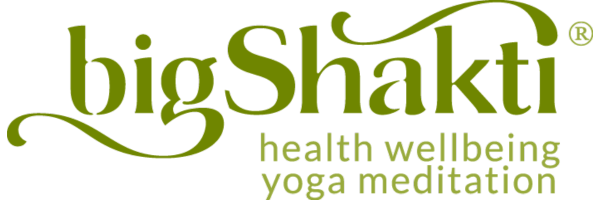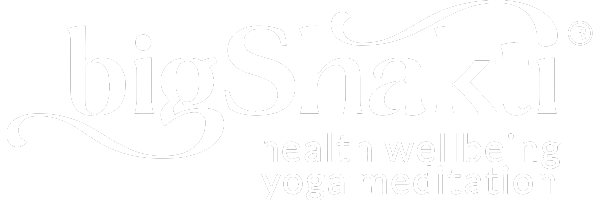Yoga of Mental Health Workshops → More Info
My Third Eye Chakra is Blocked - How To Unblock It?
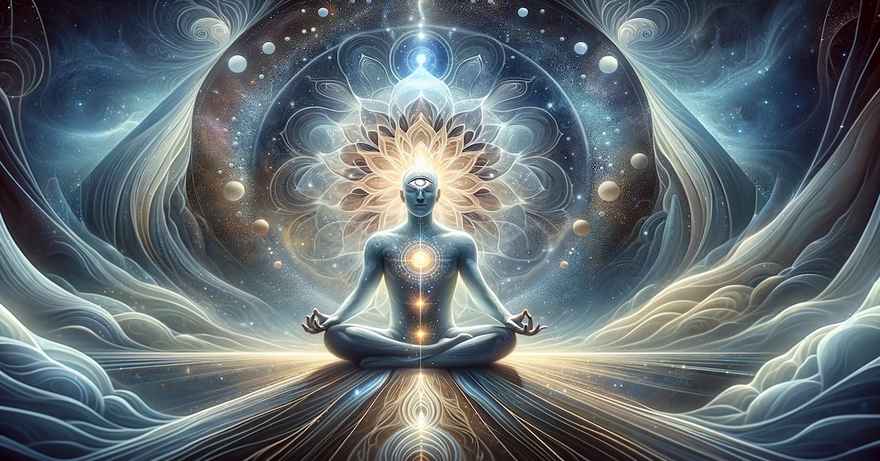
If you’ve ever felt lost, unable to connect with your intuition, or trapped in constant overthinking, it’s possible your third eye chakra is blocked. This chakra, also known as ajna chakra, plays a vital role in your mental clarity, self-awareness, and connection to your inner wisdom.
When the third eye is functioning well, you feel aligned with your purpose, can see situations clearly, and confidently make decisions. However, when your third eye chakra is blocked, it can create confusion, anxiety, and a sense of disconnection from both yourself and the world around you.
In this article, we will explore the common causes behind a blocked third eye chakra and offer practical steps to help restore balance. This will allow you to reconnect with your intuitive mind and regain a sense of clarity and inner peace.
Why is the third eye chakra blocked?
There are several ways that the chakras can feel blocked:
- Energy distribution blockage – The channels that distribute energy and consciousness to the third eye chakra are blocked or out of alignment.
- Conflict between several chakras - If the third eye chakra conflicts with a lower chakra, the lower chakra might dominate and suppress the third eye. An example is when our base chakra, muladhara, in charge of trust and security, dominates the third eye chakra. We can feel insecure and feel that we are not enough or don’t have enough even though our third eye informs us rationally that everything is OK. We might then obsessively run after material objects even though we know they can’t fully satisfy us.
- Insufficient energy - In most people, all the chakras operate at a very low voltage, just enough to power day-to-day consciousness. There is not enough energy to power the chakra. When this occurs in the third eye chakra, we feel foggy and cannot think clearly or make decisions.
- Too much energy - The other side of the coin is when one chakra is overcharged and stuck in overdrive. If the third eye is overactive, we think too much and become prone to ungrounded fears and anxieties.
The blog post My Chakras are Blocked—How to Unblock Them explains the different ways the chakras can be blocked in detail.
What does the third eye chakra govern?
Ajna lies in the middle of the brain behind a point between the two eyebrows. Draw a line between the two ears and another between the eyebrow center and the back of the head. Ajna chakra lies at the point where these two lines intersect.
Ajna controls the whole brain. However, it has a special relationship with the brain's outer layers, called the cortex or the grey matter. This is the brain's most evolved part, governing the higher and more evolved human structures and functions. If the third eye chakra is blocked, we may suffer from cognitive decline and eventually dementia.
The third eye, ajna chakra, governs all mental functions, including the four organs of the mind:
- thinking
- intelligence
- ego, and
- memory.
If this chakra is blocked, these organs will not function properly.
It is called the third eye chakra because it allows us to gaze within and “see” our inner being. We become a seer, a knower of the truth of who we are. We can “see” our mind and access its many amazing powers and abilities. We can also see the world around us with greater clarity because
It is important to understand that we can only “see” the other chakras when we have refined our awareness and achieved inner vision by activating our third eye chakra.
The third eye chakra rules the brain and mind and, when healthy, supports self-awareness and the ability to know, understand, feel, and experience life, make good decisions, and see into the future.
Ajna chakra is stimulated and activated every time we become self-aware and meditate. The more we stimulate our third eye chakra and develop a strong relationship with ourselves, the more we can access the riches within us, which we can share with others.
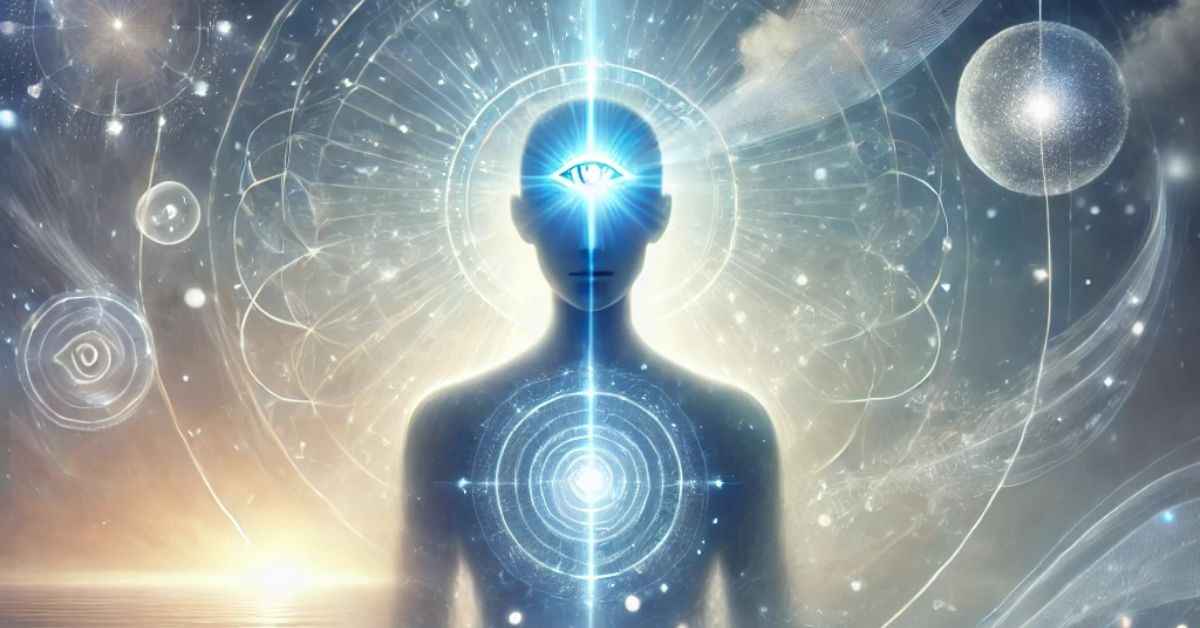
What happens when our third eye chakra is “blocked”?
When the third eye chakra is blocked, we can suffer from physical and psychological conditions. We have a kind of inner blindness in which we feel disconnected from our inner selves and feel at the mercy of our minds.
If ajna chakra is undeveloped, weak, or not functioning correctly, we feel lost, confused, and unable to think properly. We feel empty and in a state of ignorance, of “not knowing” how to be or what to do in the world to gain meaning and lasting satisfaction. Disconnection from our inner being, higher mind, and intuition drives us to seek information outside of ourselves to fill in the inner void.
Physical dysfunction
When the third eye chakra is blocked and dysfunctional, it can lead to nervous system disorders, such as epilepsy, deficiencies in our senses, poor eyesight, glaucoma, ear problems, and sinusitis. It also leads to cognitive decline and dementia, which are signs of extreme physical dysfunction within the ajna chakra domain.
Psychological dysfunction
When the third eye chakra system is undeveloped or blocked, we feel only partially awake, and life is like a dream. Our perceptions are clouded, and the mind is dull and easily disturbed. We cannot think clearly and are prey to foolish thoughts, anxieties, rumination, and unruly emotions.
The following symptoms and conditions highlight the interconnected nature of our mental, emotional, and spiritual well-being.
Disconnection from feeling and intuition
When the third eye chakra is blocked, we are unable to use our intuition and can suffer from general anxiety or unease. Perhaps the most common issue is the disconnection of the lower-thinking mind from the higher, knowing, intuitive mind. There is usually a disconnect between analytical thinking and intuitive wisdom.
We become disconnected from feeling and intuition, the higher functions of the mind. We are stuck in overthinking, but we cannot make decisions because we cannot access feelings and intuition.
When our intuitive faculties are compromised, it often manifests as a pervasive sense of unease or generalized anxiety. We feel cut off from our deeper insights and emotional intelligence. As a result, we find ourselves caught in a cycle of overthinking, unable to move beyond logical analysis to tap into our gut feelings or intuitive understanding.
This state can paralyze decision-making as we struggle to integrate rational thought with intuitive knowledge. Without access to this fuller spectrum of mental resources, we may feel adrift, second-guessing our choices, and unable to trust our inner guidance.
These concepts, drawn from yoga-tantra philosophy, align with psychological observations about the interplay between analytical and intuitive thinking processes.
Ungrounded fantasy
When our capacity for conscious imagination diminishes, we become vulnerable to distorted perceptions and thought patterns. This loss doesn't mean images cease to exist in our minds; rather, they retreat into the unconscious beyond our immediate awareness.
Without the ability to consciously form and manipulate mental images, we may struggle to process experiences, solve problems creatively, or envision positive outcomes. This deficit can leave us susceptible to rigid thinking, cognitive distortions, and potentially harmful behavioral patterns.
Imagination untethered from reality can veer into the realm of fantasy, which, when excessive, may disconnect us from the practical aspects of our lives. When this detachment combines with anxiety stemming from a lack of self-connection, it can create a perfect storm of negative cognition.
We may find ourselves catastrophizing—imagining worst-case scenarios with alarming vividness—while simultaneously struggling to conceive of positive future possibilities. This imbalance can lead to feelings of hopelessness and contribute to depressive states as our mental landscape becomes dominated by fears and perceived insurmountable challenges.
Loss of creativity
Along with the loss of imagination comes the loss of creativity. Loss of creativity is most likely to occur when we think too much or when anxiety takes hold. Constant worry, racing thoughts, and rumination, which are characteristic of anxiety, can overwhelm the mind, leaving little room for the free-flowing, imaginative thinking that fuels creativity. We can feel like we are in a fog that obscures our usual sources of inspiration. It is hard to generate new ideas or approach problems from fresh angles.
The fear of failure or judgment that often accompanies anxiety can also lead to self-censorship, causing us to dismiss creative impulses before they have a chance to develop. As a result, we may find ourselves stuck in rigid thinking patterns, unable to access the playful, exploratory mindset that's crucial for creative expression.
This loss of creativity can be particularly frustrating. It may even exacerbate feelings of anxiety, creating a cycle that's challenging to break without intentional effort to manage anxiety and nurture our creative selves.
Loss of meaning
If we cannot understand what something means, we lose our ability to understand the purpose of that thing, event, or experience. Loss of meaning creates a state in which things seem meaningless; in extreme cases, life can feel meaningless.
Our capacity to derive meaning from experiences is crucial to our psychological well-being. If we lose our ability to interpret the significance of events, objects, or encounters in our lives, we risk losing our sense of purpose and direction. Our meaning-making faculty is blocked, which can lead to a state of existential confusion, where the world around us seems devoid of coherence or importance.
In more severe cases, this perceived absence of meaning can extend to life itself, potentially leading to a profound sense of emptiness or nihilism. This loss of meaning is not merely an intellectual concern; it can profoundly affect our emotional state, motivation, and overall quality of life.
Psychologists and philosophers have long recognized the human need for meaning as a fundamental aspect of mental health and personal growth. Addressing this challenge often involves developing new frameworks for understanding, self-reflection, and seeking connections between our experiences and our values or larger life narratives.
Disconnection
When the third eye chakra is blocked, our awareness is diminished. We don’t have enough energy to power the brain and mind, and what energy there is cannot flow to the areas of the brain and mind required for awareness.
We may experience a profound sense of disconnection from life. This state is called dissociation. This state can manifest as a feeling of being an observer rather than an active participant in our own experiences. Such detachment can lead to a sense of alienation, where we feel isolated even in the company of others and may struggle to form meaningful connections.
In more severe cases, this disconnection can evolve into feelings of hopelessness and helplessness, as if we're powerless to change our circumstances or engage fully with life. In more extreme states, it can manifest as depersonalization-derealization disorders when someone always or often feels that they see themselves from outside their body and derealization.
This state of partial awareness usually impacts our emotional landscape. We might notice a lack of spontaneity in our reactions and interactions as if we're operating on autopilot. Our emotional responses may feel muted or lacking in depth, robbing our experiences of their usual richness and vibrancy. This emotional flatness can create a sense of existential aridity, metaphorically akin to wandering in a desert - surrounded by life but unable to engage with or draw sustenance from it fully.
It's important to note that while these concepts are rooted in yoga-tantra philosophy, they are equivalent to psychological observations about dissociation, emotional numbness, and existential crises.
Lack of purpose
When the third eye chakra is blocked, we can lack or feel confused about our purpose and have little or no direction in life. We may experience a profound sense of disorientation and aimlessness.
This state can manifest as a pervasive confusion about our role and reasons for being in the world. Without a clear sense of purpose, we may struggle to set meaningful goals or plan for the future, feeling instead like we're drifting aimlessly or at the mercy of external circumstances.
This lack of direction can extend to our self-concept, making it challenging to understand our place within the broader context of our environment and relationships. The resulting feeling of being lost or untethered can be deeply unsettling, potentially leading to existential questioning and a sense of meaninglessness.
These ancient views resonate with Western psychological research on identity formation, self-actualization, and the human need for meaning and purpose.
Inability to relate to ourselves and others
When the third eye chakra is blocked, we can feel ungrounded, emotionally unstable or detached, and unable to relate to ourselves and others. A poor or fragile self-image and low self-esteem lead us to seek validation and identity from external sources rather than cultivating a solid internal foundation. We feel a lack of contentment, and our mood can be shallow, frivolous, and inappropriate to our current situation.
We might oscillate between feeling ungrounded and detached, struggling to engage authentically with our experiences or form genuine connections with others. This emotional volatility can manifest as seemingly shallow or inappropriate responses to situations, further reinforcing feelings of alienation or misunderstanding.
These concepts align with psychological observations about self-concept, emotional regulation, and interpersonal relationships.
Inability to learn
When ajna is unhealthy, learning from experience can be challenging.
We feel ignorant and trapped in thinking rather than knowing. Living a life based on thinking without knowing is to live in a confused haze in which there is no certainty. We may depend on others to direct us.
We may use distraction as a way of avoiding this state, which is the basis of ADHD.
Extreme dysfunction
In extreme cases, the most basic functions are disturbed, leading to a profound disruption of the person's core sense of self.
These manifestations may include symptoms associated with serious mental health conditions such as psychosis, where one's grip on reality becomes tenuous. This can involve hallucinations, where perception itself is altered, or disordered thinking that makes it difficult to organize thoughts coherently. Delusions, or fixed false beliefs resistant to contrary evidence, may emerge when rigid thought patterns dominate one's cognitive processes.
Other potential symptoms include obsessive-compulsive tendencies, manic episodes, depressive states, or experiences of depersonalization and derealization, where one feels detached from oneself or perceives the world as unreal.
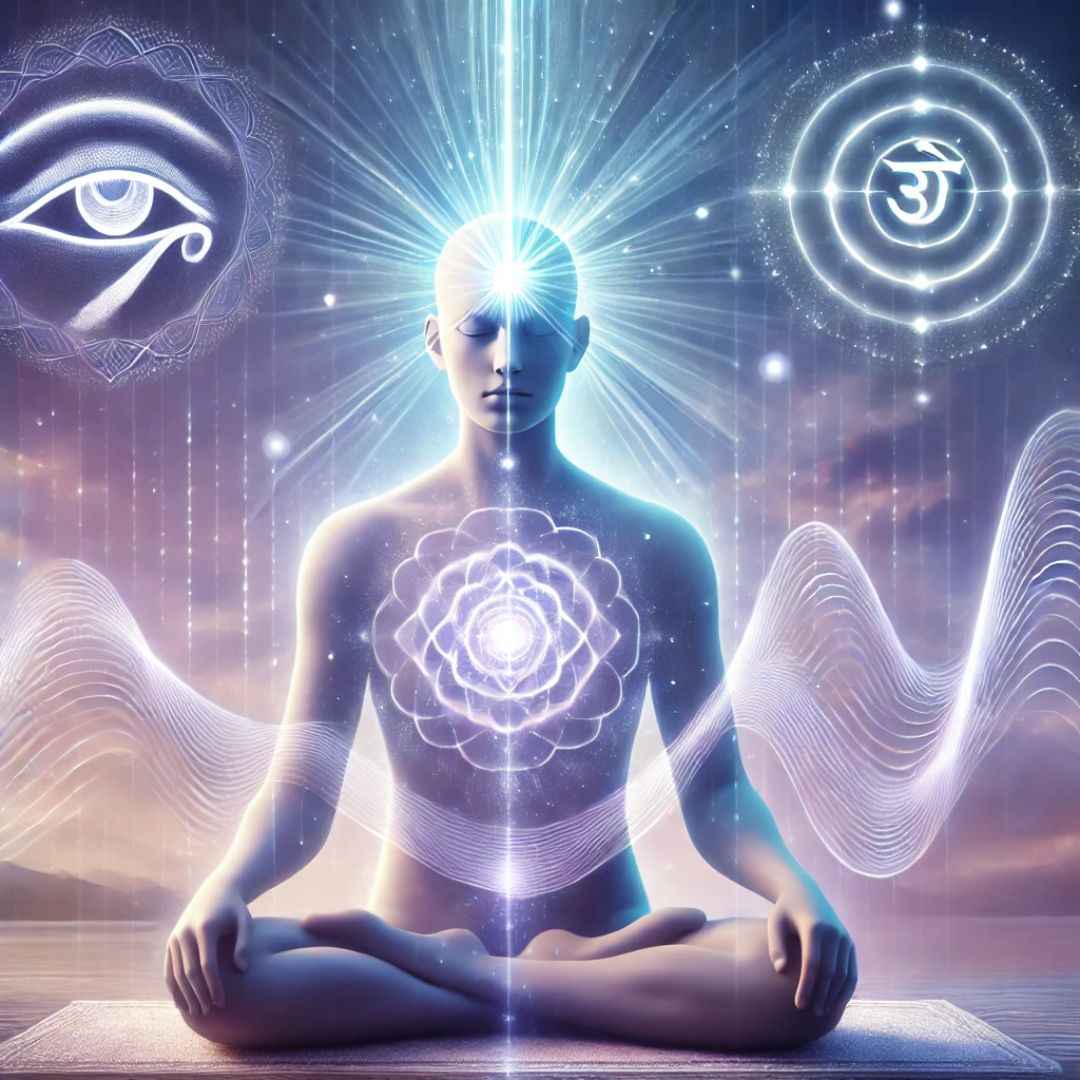
Rebalancing and Unblocking the Third Eye Chakra
The third eye chakra governs the mind and is the gateway to higher consciousness and intuition. A dysfunctional third eye causes excessive, muddled thinking, leading to anxiety, self-doubt, and errors in judgment. However, by awakening your third eye of intuition, you will align the organs of your mind, reduce anxiety, and enhance your decision-making abilities.
And it is vital that you start your journey into the chakras by meditating on your third eye chakra. This is because it is the command center that controls all the other chakras below it. Therefore, it is the most important chakra on which to start meditating.
Yoga-tantra provides the knowledge and techniques to purify, strengthen, and illuminate the ajna chakra. Techniques such as purification, postures (āsana), breathing techniques (prānāyāma), and meditations enable you to feel deep into the chakras, injecting consciousness deep into both the gross and subtle layers within the chakra area, releasing the energy stored in potential form and actualizing the chakra.
Third Eye Chakra Purification
Purifying the chakras, especially the third eye chakra, can be a transformative yet delicate process. As we meditate and direct our awareness toward these energy centres, latent energies and emotions may surface, sometimes bringing unresolved issues to light. Without proper guidance, this experience can feel overwhelming or confusing, as the process of purification often requires us to confront deep-rooted mental and emotional patterns.
This is why guidance is essential during chakra purification. An experienced teacher can help you navigate the challenges, offering the support and tools needed to process these experiences safely and effectively. Under skilled guidance, the process becomes more manageable, allowing you to strengthen and activate the chakras with confidence and clarity, leading to greater balance and spiritual insight.
Our Awaken the Third Eye of Intuition Course and the Light on the Chakras and Kundalinī Course provide this structured, step-by-step support, ensuring that your chakra purification is a positive and transformative experience.
We have created the Awaken the Third Eye of Intuition Course, to guide you to successfully purify, strengthen, and activate the third eye of intuition.
We created the Light on the Chakras and Kundalinī Course to provide a deep dive training into all the chakras. It guides you from the very first steps of preparing for chakra awakening up to techniques that activate and awaken kundalini, the cosmic power stored in potential form in the human body.
Both courses utilize the various tools of yoga-tantra that allow you to manipulate the subtle energy that powers the chakras, the substratum of the physical body.
As you unblock and purify your third eye chakra, remember that the process is not about rushing towards an end goal, but about deepening your connection to yourself, your mind, and your higher awareness. With proper guidance and a consistent practice, you can gradually cleanse and activate your third eye, allowing you to see clearly, think intuitively, and make decisions with confidence.
Whether you’re new to chakra meditation or have been exploring these practices for some time, our courses offer the tools and knowledge you need to support your journey. By working with the energy of the third eye and beyond, you can harmonise your mind, body, and spirit, and experience a profound sense of inner clarity and peace.
For those ready to take the next step, the Awaken the Third Eye of Intuition Course provides a structured path to deepen your practice
The Light on the Chakras and Kundalinī Course offers a comprehensive exploration of all the chakras. Both are designed to guide you safely and effectively through the stages of chakra purification and activation, helping you access the rich potential within.
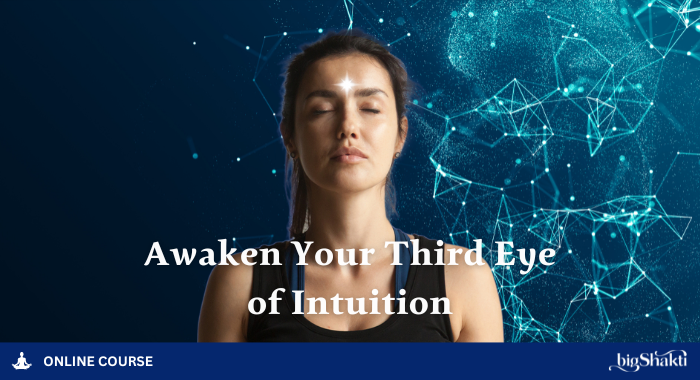
Consider engaging in a systematic study of the third eye with our Awaken Your Third Eye of Intuition Course.
The course will guide you through the process of activating your third eye, helping you access your inner guide and cultivate a deep sense of self-trust and spontaneous confidence. This course provides you with the tools and knowledge to harmonize your mind, body, and higher consciousness.
Categories
- Yoga (13)
- Yoga Tantra (20)
- Meditation (23)
- Meditation Techniques (31)
- Ayurveda (3)
- Carl Jung (5)
- Chakras (14)
- Consciousness (17)
- Diseases (7)
- e-mag (9)
- Everyday Wisdom (6)
- Life Purpose (8)
- Mantras (18)
- Mental Wellness (44)
- Podcast (23)
- Prana - The subtle breath (14)
- Relaxation (18)
- Shadow Self (7)
- Spirituality (12)
- Symbols (2)
- Third Eye - Ajna Chakra (7)
- Wisdom (2)
- Yoga Nidra (12)
- Yoga Philosophy (16)
- Yoga Psychology (19)
- Yoga Therapy (41)
- Yoga Meditation Research (3)
- Articles by Jayne Stevenson (14)
- Articles by Swami Shankardev (25)
- Stress Management (11)
- Emotion (3)
- Self-Awareness (1)
- Self-Regulation (1)
- Healing (3)
2025 Yoga of Mental Health Workshops
- Sāṁkhya Philosophy & Mental Health: A Yogic Path to Holistic Well-being
- Uncovering the Roots of Mental Illness: Insights from the Gita & Patanjali
- Restoring Self-Regulation: Yogic Techniques for Emotional Resilience & Inner Strength
- Mantra Therapy: Transforming Thought Patterns for Emotional Healing & Mental Wellbeing
